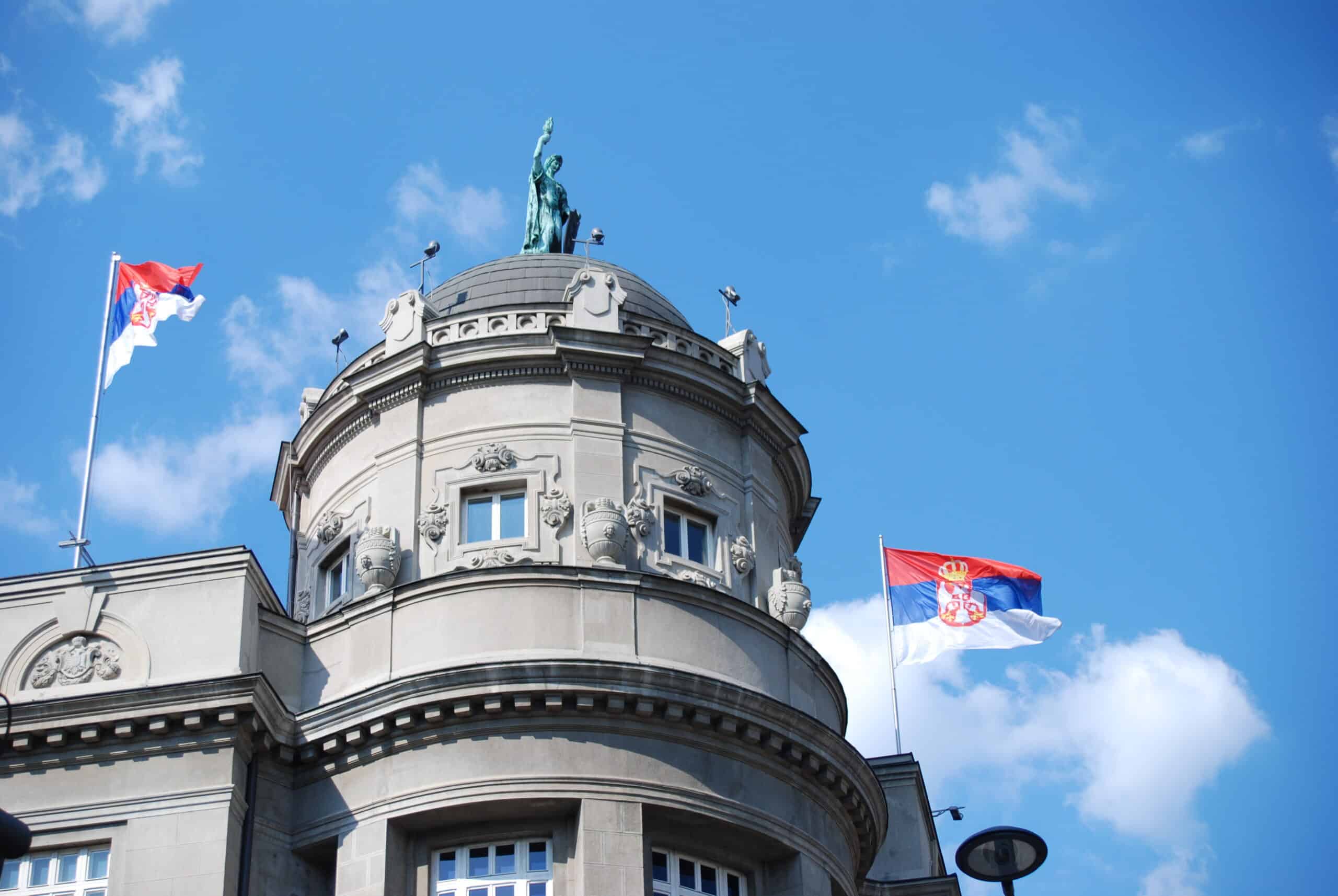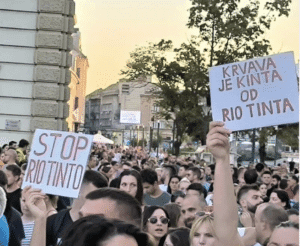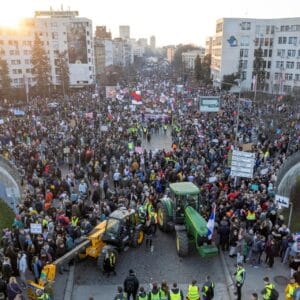Photo: Serbian flags flying on a government building in the capital. Source.
On June 2, local elections take place in Serbia. It will see the local governments that did not hold off-year elections in December 2023 go to the polls. In the capital Belgrade, which also held elections in December 2023, there will be a re-run after no majority was formed to govern the city. The elections, especially in Belgrade, will be closely observed after widespread reports of irregularities and fraud during the previous local elections. Subsequently, large-scale protests erupted in Serbia’s cities, especially in Belgrade.
The elections
65 municipalities already held elections alongside the parliamentary elections in late 2023, of which only the Belgrade elections will see a re-run. Voters will go to the polls in the other 66 cities and municipalities across Serbia, including in several big cities such as Niš and Novi Sad.
Initially, the local elections were not to be held alongside the re-run in Belgrade as Serbian law does not allow for such simultaneous elections. Ana Brnabić, president of the National Assembly, claimed it would be ‘unconstitutional and unacceptable’ in response to opposition requests for amendments to the law. Later, however, Brnabić announced that the SNS leadership decided to go along with opposition demands to hold both elections on June 2.
Belgrade re-run
The Belgrade elections were initially scheduled to be held in 2026. Instead, the decision was made to hold them alongside snap parliamentary elections, (partial) local elections and the Vojvodina provincial election. Belgrade’s mayor Šapić resigned in late September, paving the way for new leadership. The SNS coalition led by Aleksandar Šapić but under the unofficial leadership of president Vucic, garnered nearly 40% of the votes which gave them 49 seats. The pro-European, anti-corruption ‘Serbia Against Violence’ coalition (SPN) acquired a little over 35% of the votes and 43 seats. The new We – The Voice from the People party (MI-GIN) founded by conspiracy theorist Branimir Nestorovic gained 6 seats.
After the previous Belgrade elections in 2022, the SNS coalition partnered with the Socialist Party of Serbia (SPS) to form a majority even though opposition parties won more votes. The 2023 election results offered no possibilities for such a coalition, mainly due to the loss of three seats by the SPS coalition and the refusal of Nestorovic to work with established parties. Officially, the inability of parties to form a majority is stated as the reason for the re-run. However, some analysts consider the re-run to be an easy way out for the SNS after it was accused of rigging the elections in favour its own candidates.
Electoral conditions
After the 2023 parliamentary and local elections, there were widespread reports of irregularities and election fraud. OSCE observers were present during the elections at the invitation of the Serbian government and found numerous irregularities. Their report states that the elections, ‘though technically well-administered and offering voters a choice of political alternatives, were dominated by the decisive involvement of the president, which together with the ruling party’s systemic advantages created unjust conditions (…).’ Such systemic advantages include a state-dominated media landscape, misuse of public resources and pressure on public sector employees. Prior to the elections there had also been reports of intimidation and harassment of civil activists, journalists and other members of civil society. Many of these cases remain unresolved.
The ruling SNS party was also accused of facilitating ‘voter migration’, mainly to Belgrade. A CRTA report presents credible evidence that large-scale voter migration took place and that those voters disproportionately voted for the incumbent SNS. The report states that ‘considering the scope and diversity of electoral abuses in Belgrade CRTA concluded that the results of the Belgrade elections do not reflect the freely expressed will of voters living in Belgrade’. The Vucic government has consistently done very little to address the recommendations, seemingly benefiting from many flaws in the system.
Opposition and boycotts
The SPN coalition that so effectively leveraged societal unease about increasing violence after two mass-shootings in 2023 has fallen apart. A majority of the parties in the coalition has decided to run in Belgrade as well as in most of the other municipalities. Notably, Dragan Djilas, former mayor of Belgrade, has decided not to run with his Party of Freedom and Justice (SSP) in both Belgrade and Niš. SSP’s vice-President Marinka Tepic said that “for us (SSP, red.), participating in the elections is a surrender, playing the game on their terms, and that’s the main disagreement.”
There are several issues that unite the opposition although there are significant ideological and local differences. Most of it is centred around the use of power of the current government. Electoral integrity, (high-level) corruption, media freedom and EU integration are some of the more prominent issues.
Results forecast
The main battleground in these elections will be Belgrade. The results of the December elections show that the opposition is able to mount a serious challenge to the SNS coalition. It still enjoys considerable support and it has ramped up the use of nationalist rhetoric at campaign events. SNS portrayed the UN resolution on installing July 11 as a remembrance day for the Srebrenica genocide as an attack on the Serbian people, claiming that ‘Serbia defends its honour and freedom’. Considering the previous success of nationalist rhetoric in Serbian politics, this could prove to be beneficial for the SNS in the upcoming elections.
The cohesion of the opposition, however, has proven to be fragile. With only 6 out of 9 parties from the ‘Serbia Against Violence’ coalition participating, it remains to be seen whether they can garner enough support. Especially considering the lack of possible partners in the city assembly, it could prove very hard for the opposition to gain power in Belgrade.
Novi Sad is also expected to be an interesting place to follow. Serbia’s second largest city had the biggest alliance of opposition parties participating (12). The opposition is seen to have a substantial chance to challenge SNS here. Nevertheless, SSP’s Vice-President, who boycotts the election also in Novi Sad commented that she “thinks it’s naive for our colleagues in Novi Sad to believe they can win under these conditions. They won’t win; they will face a reprise of December 17, or an even worse result.’



